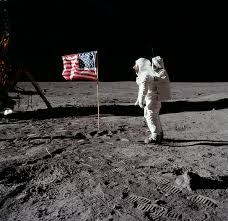 In 1961, President Kennedy established a national goal “before this decade is out, of landing a man on the moon and returning him safely to the Earth.” We did. Not long after Neil Armstrong walked on the moon in 1969, President Nixon proclaimed a similarly vital national goal, to end America’s dependence on foreign oil by the end of the next decade. We did not.
In 1961, President Kennedy established a national goal “before this decade is out, of landing a man on the moon and returning him safely to the Earth.” We did. Not long after Neil Armstrong walked on the moon in 1969, President Nixon proclaimed a similarly vital national goal, to end America’s dependence on foreign oil by the end of the next decade. We did not.
Energy independence was not just a campaign slogan, nor a passing fad. Over the next 40 years, every president, of both parties, reiterated its importance, and repeated the promise.
Gerald Ford, 1975: “A massive program must be initiated to increase energy supply, to cut demand, and… to achieve the independence we want.” Jimmy Carter, 1979: “The generation-long growth in our dependence on foreign oil will be stopped dead in its tracks right now.” Ronald Reagan, 1981: “We will continue support of research leading to development of new technologies and more independence from foreign oil.” George Bush, 1989: “The gulfs and oceans off our shores hold the promise of oil and gas reserves which can make our nation more secure and less dependent on foreign oil.” Bill Clinton, 1995: “The nation’s growing reliance on imports of crude oil… threatens the nation’s security.” George W. Bush, 2001: “America must become more energy independent, and we will.” Barack Obama, 2008: “I will set a clear goal as president – In 10 years, we will finally end our dependence on oil from the Middle East.”
During those 40 years, though, the U.S. doubled the percentage of its oil imported (from 35 percent to nearly 70). Despite the almost unanimous intent to wean our economy from the clutches of foreign oil, our country did exactly the opposite for two generations.
What if we finally accomplished a goal that lofty, that imperative – and nobody noticed? It sounds absurd, as if Neil Armstrong’s moon landing had been unnoticed, rather than watched on nearly every TV in the world. Yet that is precisely what has happened.
Almost alone on December 7, Investor’s Business Daily (not on most Americans’ reading list), reported that “Last week, the U.S. exported more oil than we imported, for the first time in 70-plus years.”
Why did energy independence take so long? The simple truth is that the government stubbornly pursued policies that encouraged dependence on imported oil. One unfortunate consequence was the largest transfer of wealth in human history (from America to the Middle East), which unquestionably made the world more dangerous. By the end of Obama’s first term, the U.S. was spending $700 billion per year importing oil, much of it from countries whose supply was unreliable, at best. Government forecasts regularly warned of a society running out of resources.
But something remarkable happened instead. Vast oil and gas reserves were discovered, beyond the wildest dreams of government’s dire predictions – especially in the northeast and the Dakotas – on private land where the government could not stop its production. Advanced technologies like directional drilling and hydraulic fracturing enabled competitive production of those resources. Domestic production skyrocketed, and imports steadily declined – not because of government policies, but despite them.
America is now poised to supply much of the world’s energy, perhaps again changing the global politics of war and peace.
The Energy Department says demand by 2030 will grow 40 percent in the U.S., and a whopping 95 percent in developing countries. That should be considered a tremendous achievement, as billions of the world’s people are finally escaping poverty. Some environmental elitists lament that people in China and India now want cars and electric homes, but we have no right to stop them. Rather, we ought to focus on supplying the world’s energy in a responsible manner. This week’s news represents an incredible milestone on that road.
Previous government policies ranged from Nixon urging everyone to turn down their thermostats, and Carter suggesting sweaters, to Obama’s attempt to bludgeon the energy industry out of business. The Trump approach, seeking “energy dominance,” has instead concentrated on lifting regulatory impediments. The result seems to prove all we really needed was for government to get out of the way and let the marketplace work.
To borrow from Kennedy’s space speech, we chose energy independence, “because that goal helped organize and measure the best of our energies and skills, because that challenge is one that we are willing to accept, one we are unwilling to postpone, and one which we intend to win.” We did, and we should be bursting with national pride about it.
This column first appeared in the Grand Junction Daily Sentinel December 14, 2018.




Comments on this entry are closed.
{ 1 trackback }